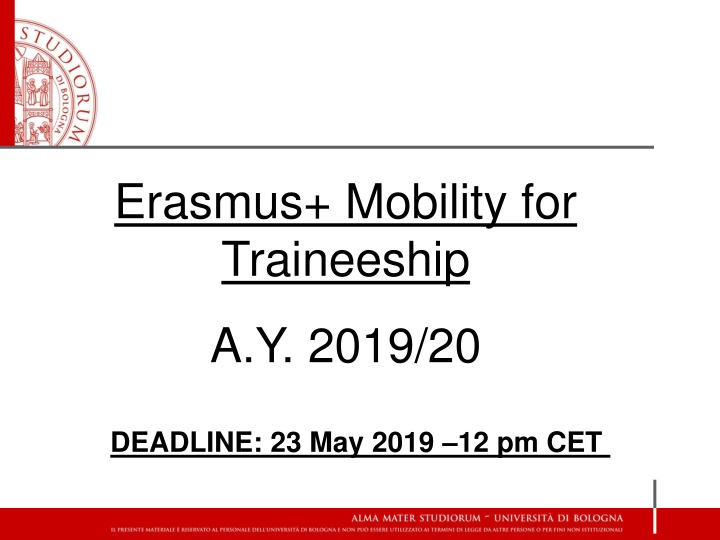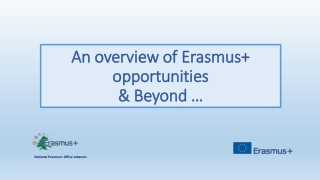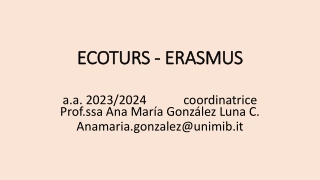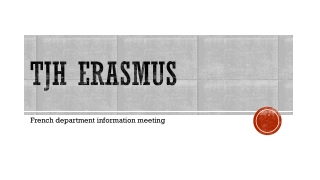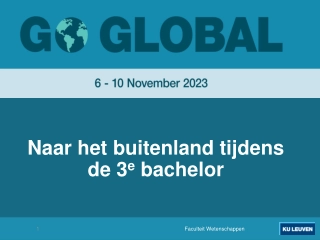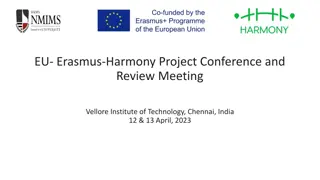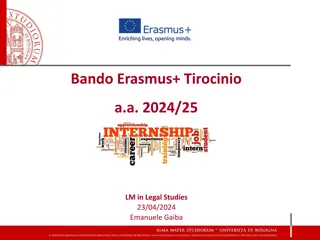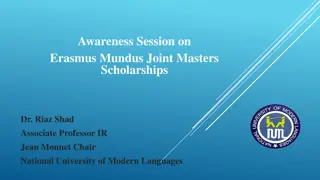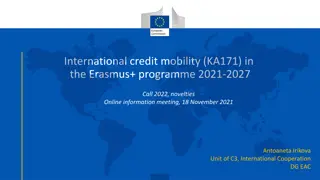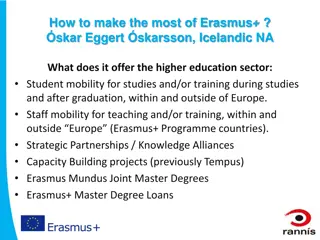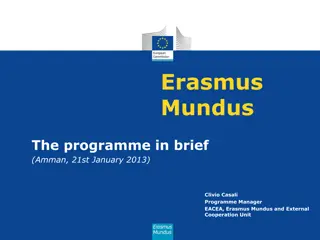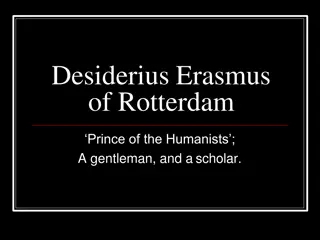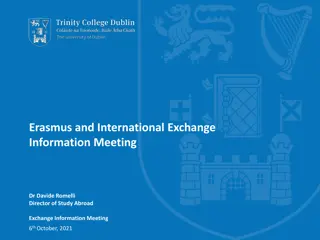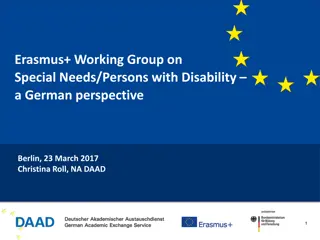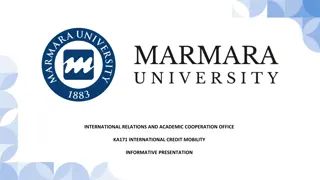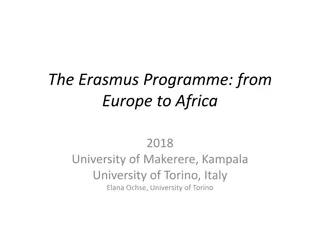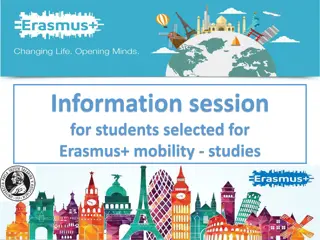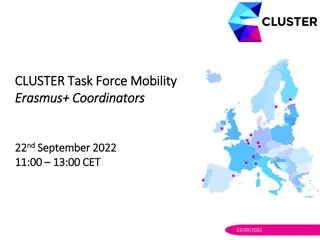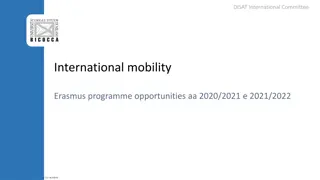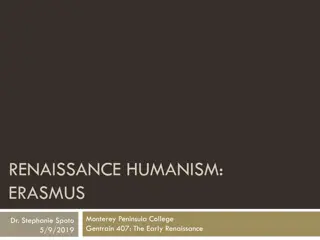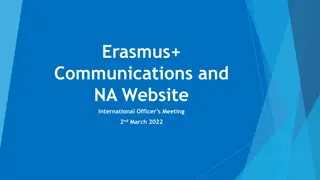Erasmus+ Traineeship Opportunities for 2019/20
Erasmus+ offers traineeship grants for eligible students to gain international experience in various fields across Europe. Traineeships can last two or three months and provide financial support based on the destination country's cost of living.
Download Presentation

Please find below an Image/Link to download the presentation.
The content on the website is provided AS IS for your information and personal use only. It may not be sold, licensed, or shared on other websites without obtaining consent from the author.If you encounter any issues during the download, it is possible that the publisher has removed the file from their server.
You are allowed to download the files provided on this website for personal or commercial use, subject to the condition that they are used lawfully. All files are the property of their respective owners.
The content on the website is provided AS IS for your information and personal use only. It may not be sold, licensed, or shared on other websites without obtaining consent from the author.
E N D
Presentation Transcript
Erasmus+ Mobility for Traineeship A.Y. 2019/20 DEADLINE: 23 May 2019 12 pm CET
Erasmus+ Traineeship Expected grants for 2019/20: 542 Student who are ranked as eligible (IDONEI) without receiving the grant might ask for Erasmus zero-EU grant status, which allows them to obtain a number of mobility benefits without receiving the EU grant. Candidates nationality All students may apply, whether EU or non-EU citizens, including those with stateless or refugee status, provided they are enrolled at the University of Bologna.
Erasmus+ Traineeship Countries where traineeships (internships) may be performed Erasmus+ Mobility for Traineeships gives students a chance to carry out a traineeship with a business, training centre, university, research centre or other organization in countries belonging to the programme: the 27 European Union member states, the 3 countries of the European Economic Area (Iceland, Liechtenstein, Norway), and the former Yugoslav Republic of Macedonia. New entry: Serbia. Mobility to Switzerland and Turkey is not eligible. Mobility to UK will be eligible provided that an Agreement which guarantees the continuity of the Erasmus+ Programme is signed.
Erasmus+ Traineeship Length of the traineeship The traineeship may last two or three months. The financial contribution covers the chosen duration, though internships shorter than 2 months (60 days) are not eligible. The mobility period can be extended, upon the student s request, but no further grant will be assigned. The traineeship may begin on any date between 1 September 2019 and 30 June 2020 (with the exception of students applying for a future career ), and must end by 30 September 2020 at the latest, on penalty of the contribution being withdrawn. The traineeship must run without interruption or pauses.
Erasmus+ Traineeship Financial contribution (1/2) European Union funding for Erasmus+ Mobility for Traineeships differs according to the destination country, as in the following table: GROUPS COUNTRIES MONTHLY AMOUNT 400 euros Denmark, Finland, Iceland, Ireland, Luxembourg, Liechtenstein, Norway, group 1 (high cost of living) Sweden, UK, Austria, Belgium, Germany, France, Greece, Spain, Netherlands, Malta, Portugal, 350 euros group 2 (medium cost of living) Cyprus, the Bulgaria, Croatia, Czech Republic, Estonia, Latvia, Lithuania, Hungary, Poland, Romania, Serbia, Slovakia, Slovenia, Republic of Macedonia 350 euros group 3 (low cost of living)
Erasmus+ Traineeship Financial contribution (2/2) An additional contribution of 100 per month is foreseen for candidates coming from poor socio-economics backgrounds. This contribution will be granted to candidates with ISEE 2019 declaration and/or the documentation concerning the income and asset situations (for international students whose nuclear family has income and/or assets abroad) for services for the right to higher education up to 23,000. This declaration must be submitted by grant winners and suitable candidates, according to the procedures and deadlines that https://www.unibo.it/en/international/internship-abroad/erasmus-mobility-for- traineeship/erasmus-grant In any case, candidates are recommended to promptly apply for the ISEE certificate. Also the candidates, who are enrolled in the 2018/19 academic year and expect to graduate by March 2020 without renewing the enrollment in the 2019/2020 academic year, are required to submit the ISEE 2019, according to the timing and procedures that will be communicated. will be communicated on the page Please note that students failing to respect the deadlines will not receive this contribution.
Erasmus+ Traineeship Who can apply 1/3 Both students and new-graduates may apply (the latter must submit their application while still non-graduated) according to the following rules: - Students must be enrolled in academic year 2018/19 for a first-cycle, single-cycle, or second-cycle degree programme and renew their enrolment for the 2019/2020 academic year by the deadline established by the University. Students enrolled in their third year, or who are fuori corso (past the envisaged completion time for the degree course), of an undergraduate degree programme who expect to graduate during the 2018/2019 academic year may perform the internship during the first year of their graduate degree programme (second cycle). These students, who apply with reserve, ( future career application) must be enrolled for a graduate degree programme in the 2019/20 academic year and are allowed to carry out the mobility not before January 2020.
Erasmus+ Traineeship Who can apply 2/3 - New-graduates must be enrolled in academic year 2018/19 for the last year of their study cycle and not yet have graduated by the deadline for this application procedure (23 May 2019); IMPORTANT - Students may not be awarded their qualification before their mobility period ends, but must wait for their traineeship abroad to conclude. - By contrast, new graduates mobility period must start after their degree/specialisation/PhD qualification has been awarded as it is not possible to graduate during the mobility period. The traineeship abroad as a new graduate must be carried out and completed within one year of obtaining the graduation.
Erasmus+ Traineeship Who can apply 3/3 Specialisation school students, residents and PhD students: must be properly enrolled in medical or non-medical specialisation schools or a PhD programme run by Unibo; those enrolled in certain specialisation schools are eligible if they were enrolled in years prior to that of the call for applications, due to the scheduling of the respective ministerial calls for applications. For suspensions or extensions of training as prescribed by applicable regulations, students are allowed to apply provided they are enrolled before the regular enrolment date for one s specialisation programme/PhD. For a traineeship after having obtained their qualification, students must be enrolled in the last year of their specialisation/PhD programme on the closing date of the call (23 May 2019). IMPORTANT: Since specialist or resident training contracts terminate on the date the legal study programme expires, a mobility period, if undertaken after one s specialist qualification has been awarded, does not entail the extension of specialist training or contract thereof, and entitles one solely to the monthly contribution established by the Erasmus+ traineeship programme.
Erasmus+ Traineeship Eligibility conflicts 1/2 Erasmus+ mobility experiences and grants can be repeated up to the a maximum of 12 months (360 days) per degree. The limit for single-cycle degrees is 24 months. Both study activities and traineeships are included in the 12 months; Prior mobility experiences under a Lifelong Learning Programme, Erasmus Mundus Programme (Action1 and Action 2), or Erasmus+ Programme counts towards the mobility period maximum of 12 months for each cycle. Likewise, mobility for traineeships undertaken by a new-graduate as part of Erasmus+ forms part of the 12 month-per-cycle period. When submitting the application, the system will check prior mobility experience information which the University has on record. The application can be saved only if the candidate has at least 60 days of mobility available. Candidates who have more than 60 days but less than 90 days must choose the two month duration. These requirements must be maintained until the beginning of the mobility.
Erasmus+ Traineeship Eligibility conflicts 2/2 Students who have been awarded other grants paid for by the European Union or University of Bologna are not eligible for an Erasmus+ Mobility for Traineeships grant when it overlaps, even partly, with the Erasmus+ traineeship period. However, applying and getting the grant is possible for mobility programmes that will take place in the same academic year and for the same purpose (traineeship), provided that these periods are consecutive. Erasmus+ Mobility for Traineeships contributions cannot be combined with grants awarded for Joint Master s Degree programmes (ex Erasmus Mundus Action1).
Erasmus+ Traineeship Language requirements 1/2 In order to apply, students must exhibit a language certificate as evidence of language skills, to be proved in one of the following ways: having passed a language proficiency test (idoneit ) at the Bologna University Language Centre (CLA) or other university counterparts, the level being at least B1, even in previous study programmes; having passed a language exam with a grade of at least 25/30; being enrolled on a degree programme entirely taught in English; such students may only claim this as a language requisite if they are applying to companies which define English as the traineeship language; having obtained a certificate of attendance for credit in a level B1 or higher course (of 50 hours) at the University Language Centre. The certificate must refer explicitly to the CEFR ranking and have been issued no earlier than 1/1/2017 having passed one of the TESTs for participation in international mobility programmes at the University Language Centre held before May 2019 on dates announced directly on the language centre websites (Bologna campus and Romagna campuses), at the B1 level or above. To sit a test one must enrol online via AlmaRM (https://almarm.unibo.it ). It is possible to sit the test only once and for a maximum of two languages.
Erasmus+ Traineeship Language requirements 2/2 having passed one of the TESTs at the University Language Centre (CLA) for participants in international mobility programmes. (only if taken on or after 01 January 2017) at the B1 level or above; having obtained a certificate issued by another university language centre in Italy or Europe, at a level of B1 or above, on or after 1 January 2017; having obtained an official certificate issued by one of the Certifying Bodies in the table of equivalence of the Common European Framework of Reference, supplemented with certification of Portuguese (consult the file CEFR table on the website). The level must be B1 or higher and the date of issue not prior to 1 January 2017, regardless of the official length of validity set by the certifying body; having the ESABAC diploma (only valid for students who are applying to traineeships at companies that use French as the traineeship language); having a diploma from the Galvani Institute of Bologna in the German or English international division (only valid for students who are applying to companies that use German or English as the traineeship language) having a certificate of adequate language abilities issued by the host organisation in the Company Agreement Form.
Erasmus+ Traineeship Application procedure Each candidate may submit ONLY ONE application. Applications will only be accepted online via Alma RM https://almarm.unibo.it and following the guided procedure. The deadline to apply is WEDNESDAY, 23 May 2019 at 12 p.m. (Rome time/CET) In order to apply, candidates must: - have or obtain university credentials (username and password) enabling them to log in to AlmaRM; - read the notes on filling out an application found on the AlmaRM homepage which provide instructions for the on-line procedure;
Erasmus+ Traineeship Documents to be uploaded to AlmaRM in order to apply: a pdf file containing information on the traineeship, compiled, signed and stamped by the company, using the Company Agreement Form (see annex 4); a pdf file containing the student s curriculum vitae in European format written in Italian or English; a pdf file containing his/her reasons for wanting to do this traineeship; a pdf file containing any language certificates as specified call for applications; self-certification of the degree with a list of exams (only for those who are enrolled in the first year of a second-cycle degree and possess a first-cycle qualification from another university). The self-certification must be attached to the proper application section, visible only to students enrolled at the first year of a second-cycle degree and in possession of a first-cycle qualification from another university); any other certificates considered useful for assessment purposes. These documents must be uploaded onto AlmaRM in pdf format as part of the application (on penalty of disqualification).
Erasmus+ Traineeship POTENTIAL HOST ORGANISATIONS The organisation the student intends to do a traineeship with must conform to the description given in the Programme Guide (version 1, 2019) issued by the European Commission, that is: any public or private organisation active on the labour market or in sectors such as education, training and youth . That definition includes public and private companies (including social enterprises), training centres, schools, universities and research centres, nonprofits, associations, NGOs, and other organisations. The organisations eligible for hosting a traineeship extend to schools where students act as assistants abroad. If the traineeship is done at an institute of higher education (e.g. a university laboratory, university library, etc.), the activity must consist of vocational training and NOT study, and the training activity must be clearly stated in the work plan. International Relations Offices at institutes of higher education are eligible to host student mobility traineeships, provided the student is not performing an activity covered by an EU contribution and there is no conflict of interest.
Erasmus+ Traineeship How to find a company for the internship Candidates must find the host organisation independently and formulate the traineeship programme with said organisation. The host organisation must indicate its acceptance of the trainee by filling in and signing the Company Agreement Form (annex 4) within the call deadline (23 May). Contact persons by study field/campus may provide support in looking for companies, if they have a list of companies available. It is therefore a good idea to visit their offices as indicated in Find out more web section and find out. Students may also consult the List of websites for sourcing traineeships document (annex 3) which contains useful information on how to find a host organisation. After the submission of the application and the conclusion of the selection procedure, the host company cannot be changed.
Erasmus+ Traineeship DIGITAL OPPORTUNITY TRAINEESHIP It is worth mentioning the initiative of the European Commission "Digital Opportunity Traineeships", which is part of the Erasmus + programme and which aims to develop digital skills in students of all disciplines through direct experience within the host institutions. Will be considered as a traineeship in digital skills any traineeship where trainees receive training and practice in at least one or more of the following activities: - digital marketing (e.g. social media management, web analytics); - digital graphical, mechanical or architectural design; - development of apps, software, scripts, or websites; - installation, maintenance and management of IT systems and networks; - cybersecurity; - data analytics, mining and visualisation; - programming and training of robots and artificial intelligence applications. Generic customer support, order fulfilment, data entry or office tasks are not considered in this category. Please consult the offers on the http://erasmusintern.org/ platforms to look for traineeships aimed at developing digital skills, However, the student can independently identify the host organisation provided that the planned activities coincide with those mentioned above. and Drop'pin@Eures
Erasmus+ Traineeship Selection criteria 1) School Committee s assessment of (maximum 40 points): traineeship project content (contained in the company agreement form) and its relevance to the candidate s study curriculum, reasons for doing the traineeship, language proficiency any other factors mentioned by the student in his/her application 2) Educational career assessment (maximum 60 points) based on regularity of study and credits All students have to promptly check the data in the Studenti Online application concerning their own educational career, to ensure that all completed learning activities and exams have been recorded as at 3 June 2019 and can be used for the purposes of calculating their educational career evaluation scores.
Erasmus+ Traineeship Getting your traineeship recognised Students who take part in a mobility experience through Erasmus+ Mobility for Traineeship Programmes must follow the recognition procedure established in the regulations and course structure diagrams for their degree programme. It is possible to get credit (CFU) recognition as long as an internship activity is planned in the study plan. Winners can find out about credit recognition from their Degree Programme Office and/or Internship Office before they leave.
Erasmus+ Traineeship Entry to the host country Students are responsible for learning about: any rules concerning entry into the host country, promptly contacting the relevant diplomatic representatives in Italy; healthcare in the host country, by contacting their own healthcare board or the relevant diplomatic representatives. Legislation and regulations governing the immigration of non-EU students in different countries participating in the Erasmus+ Programme depend on the nationality of the student. Students are therefore responsible for obtaining all required information and the documents which will allow them to enter and stay in the destination country, by contacting the relevant diplomatic representatives. In particular, it should be noted that the procedure for obtaining a visa for European countries that do not belong to the SCHENGEN area (Bulgaria, Croatia, Cyprus, Ireland, Romania, the United Kingdom, Serbia) is particularly long and does not always result in a visa being issued. Non-EU students are therefore encouraged to consider this aspect when choosing the host organisation.
Erasmus+ Traineeship CALENDAR Language tests at the University Language Centre: from May 6 to May 16, 2019 to be booked on AlmaRM from April 15 10 a.m. to May 3, 2019 10 a.m. Applications open online on Alma RM: 10 April 2019 Deadline for applying: 23 May 2019 12:00 p.m.(Rome time) Ranking lists published on Alma RM: 18 June 2019 Deadline for winners to accept online via Alma RM: 24 June 2019 1 September 2019 30 June 2020: beginning of the traineeship (students applying for a future career can leave after the beginning of January 2020). 30 September 2020: final deadline for all the traineeships.
DIRI - Settore Area Geografica Europa Tel. 051 2088102 Email: erasmus.placement@unibo.it International Mobility Office, Viale Fanin 46, 2ndfloor Phone. 051.2096243 Distal.Internazionalizzazione@unibo.it www.unibo.it
